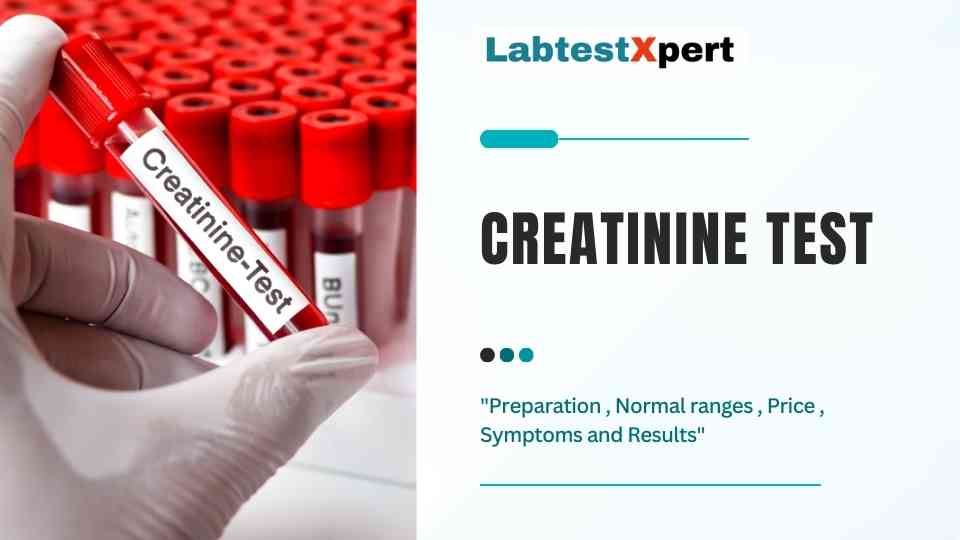Creatinine blood test is a common diagnostic tool used to assess kidney function and overall health. It measures the level of creatinine in the blood, providing valuable insights into the functioning of the kidneys. Understanding what creatinine is, why the test is important, and how to interpret the results can empower individuals to take control of their health proactively.
What is Creatinine?
Creatinine is a waste product generated by the muscles during normal metabolism. It is generated at a consistent pace and eliminated from the bloodstream through renal filtration. The level of creatinine in the blood is a reflection of the body’s muscle mass and the efficiency of kidney function.
Creatinine is a waste product generated from the breakdown of creatine, a substance found in muscles. It is produced at a relatively constant rate as a result of normal muscle metabolism. Creatinine is primarily excreted from the body through the kidneys, with a small amount eliminated through urine.
Definition:
Creatinine is a chemical compound with the molecular formula C₄H₇N₃O. It is formed in the body through the degradation of creatine, a molecule involved in supplying energy to muscles during physical activity. Creatinine is produced in muscle tissue at a steady rate and is transported through the bloodstream to the kidneys for filtration and excretion.
Alternate name of the test?
Certainly, an alternate name for the creatinine blood test is the “renal function test.”
Creatinine function:
The primary function of creatinine is as a waste product that reflects muscle metabolism. It serves as a marker of renal function, as the kidneys play a crucial role in filtering creatinine from the blood and excreting it in urine. Because creatinine is produced at a relatively constant rate, its levels in the blood can provide valuable information about kidney function and overall health.
The level of creatinine in the blood is influenced by factors such as muscle mass, age, gender, and kidney function. Healthy kidneys efficiently remove creatinine from the blood, maintaining stable levels within a normal range. However, impaired kidney function can lead to an accumulation of creatinine in the blood, resulting in elevated levels.
In summary, creatinine is a waste product of muscle metabolism that is excreted by the kidneys. It serves as an important marker of renal function and overall health, with abnormal levels indicating potential kidney dysfunction or other underlying health issues. Monitoring creatinine levels through blood tests is essential for assessing kidney health and diagnosing conditions such as chronic kidney disease or acute kidney injury.
Types of Creatinine Tests
There are several types of creatinine tests commonly used to assess kidney function and overall health:
A. Serum Creatinine Test:
- This test measures the level of creatinine in the blood serum. It is a standard blood test that provides valuable information about kidney function. Elevated serum creatinine levels may indicate impaired kidney function or other underlying health issues.
B. Urine Creatinine Test:
- This test measures the level of creatinine in the urine. Urine creatinine levels are often measured alongside other urine tests to assess kidney function and evaluate the concentration of other substances in the urine. Abnormal urine creatinine levels may indicate kidney dysfunction or other urinary tract abnormalities.
C. Creatinine Clearance Test:
- This test involves collecting both blood and urine samples to calculate the creatinine clearance rate, which reflects how effectively the kidneys are filtering creatinine from the blood and excreting it in the urine. Creatinine clearance testing provides a more precise assessment of kidney function compared to serum or urine creatinine tests alone. It may be used to diagnose and monitor kidney diseases, assess the progression of kidney dysfunction, or evaluate the effectiveness of treatments.
Each type of creatinine test serves a specific purpose in evaluating kidney function and overall health. Your healthcare provider may recommend one or more of these tests based on your symptoms, medical history, and specific concerns.
Diagnostic Tests for Assessing Creatinine Blood test
There are several diagnostic tests available for assessing creatinine levels in the body, each serving a specific purpose in evaluating kidney function and overall health. Here are some of the commonly used diagnostic tests:
- Serum Creatinine Test: This is the most common test used to measure creatinine levels in the blood. A serum creatinine test provides an indication of how well the kidneys are filtering waste products from the bloodstream. Elevated levels of serum creatinine may indicate impaired kidney function.
- Urine Creatinine Test: A urine creatinine test measures the concentration of creatinine in the urine. This test is often performed alongside other urine tests to assess kidney function and to calculate the creatinine clearance rate, which reflects how effectively the kidneys are filtering creatinine from the blood.
- Creatinine Clearance Test: This test involves collecting both blood and urine samples to calculate the creatinine clearance rate, which provides a more accurate assessment of kidney function compared to serum or urine creatinine tests alone. The creatinine clearance test measures the rate at which creatinine is cleared from the blood by the kidneys and excreted in the urine.
- Estimated Glomerular Filtration Rate (eGFR): The eGFR is a calculated value that estimates the glomerular filtration rate (GFR), which is a measure of kidney function. It is calculated based on serum creatinine levels, age, sex, and other factors. The eGFR provides an estimate of how well the kidneys are filtering waste products from the blood.
- Kidney Function Panel: A kidney function panel, also known as a renal function panel, is a group of blood tests that includes serum creatinine, blood urea nitrogen (BUN), and other markers of kidney function. These tests are often performed together to provide a comprehensive assessment of kidney health.
- Imaging Studies: In some cases, imaging studies such as ultrasound, CT scan, or MRI may be performed to assess the structure and function of the kidneys. These imaging tests can help identify any structural abnormalities or blockages that may be affecting kidney function.
- Biopsy: In certain situations, a kidney biopsy may be performed to obtain a small sample of kidney tissue for examination under a microscope. A kidney biopsy can help diagnose specific kidney diseases or conditions that may be contributing to abnormal creatinine levels.
These diagnostic tests play a crucial role in assessing kidney function, diagnosing kidney diseases, and guiding treatment decisions.
Why is a Creatinine test important?
Creatinine blood tests play a vital role in assessing kidney function and overall health. Understanding their importance is crucial for individuals seeking to monitor their well-being, especially those at risk of kidney disease or related conditions. Here’s why creatinine blood tests are significant:
- Early Detection of Kidney Problems: Creatinine levels in the blood serve as a key indicator of kidney function. By measuring creatinine levels, healthcare providers can identify potential kidney problems at an early stage, allowing for timely intervention and management.
- Monitoring Chronic Conditions: For individuals with chronic conditions such as diabetes, hypertension, or heart disease, regular creatinine blood tests are essential. These tests help monitor kidney function over time, enabling healthcare providers to adjust treatment plans as needed and prevent complications.
- Assessment of Treatment Effectiveness: Creatinine blood tests are often used to assess the effectiveness of treatments for kidney disease or related conditions. By tracking changes in creatinine levels, healthcare providers can evaluate how well interventions such as medication, lifestyle modifications, or dialysis are working.
- Identification of Kidney Disease Progression: For individuals diagnosed with kidney disease, creatinine blood tests provide valuable information about disease progression. Rising creatinine levels may indicate worsening kidney function, prompting healthcare providers to take appropriate measures to slow or manage the progression of the disease.
- Evaluation of Overall Health: Kidney function is closely linked to overall health and well-being. Creatinine blood tests offer insights into not only kidney function but also muscle health and hydration status. Abnormal creatinine levels may signal underlying health issues beyond kidney disease, prompting further investigation and preventive measures.
- Risk Assessment for Surgery or Medical Procedures: Before undergoing surgery or certain medical procedures, individuals may undergo creatinine blood tests to assess their kidney function. This helps healthcare providers determine the risk of complications related to anesthesia or contrast agents used during procedures.
- Monitoring Medication Side Effects: Some medications, particularly those metabolized by the kidneys, can affect creatinine levels. Regular creatinine blood tests allow healthcare providers to monitor for potential medication side effects and adjust treatment plans accordingly to minimize risks.
- Promotion of Patient Engagement and Education: By understanding the importance of creatinine blood tests, individuals can actively participate in their healthcare journey. Regular monitoring and discussion of creatinine levels with healthcare providers empower patients to take proactive steps to maintain kidney health and overall well-being.
Why do healthcare providers order Creatinine blood test ?
Healthcare providers order creatinine blood tests for several reasons:
- Assessing Kidney Function: Creatinine blood tests are primarily used to evaluate kidney function. Healthy kidneys filter creatinine from the blood, and measuring its levels helps determine how well the kidneys are functioning. Elevated creatinine levels may indicate impaired kidney function, prompting further investigation into potential kidney diseases or other underlying health issues.
- Monitoring Kidney Diseases: Individuals with known kidney diseases or those at risk of developing kidney problems require regular monitoring of their condition. Creatinine blood tests play a vital role in this process by tracking changes in creatinine levels over time. This allows healthcare providers to assess the progression of kidney disease and adjust treatment plans accordingly, leading to better disease management and improved outcomes.
- Routine Health Check-ups: Creatinine blood tests are often included in routine health screenings, especially for individuals with risk factors for kidney disease, such as diabetes or high blood pressure. Regular monitoring of creatinine levels enables early detection of kidney problems, facilitating prompt intervention and preventive measures to mitigate further complications.
- Evaluation of Symptoms: Patients experiencing symptoms suggestive of kidney dysfunction, such as frequent urination, swelling, fatigue, or changes in urine color, may undergo creatinine blood tests to assess kidney function and identify potential underlying causes. Timely diagnosis through creatinine blood tests can lead to timely treatment, reducing the risk of complications associated with kidney diseases.
Creatinine Blood test : Specimen and Preparation for test
For a blood test to measure creatinine levels, the following specimen and preparation are typically required:
- Type of Tube: Blood samples for creatinine tests are commonly collected using a serum separator tube (SST) or a plain red-top tube. These tubes do not contain any anticoagulants and allow the blood to clot naturally. The serum obtained after centrifugation is used for analysis.
- Sample Volume: The volume of blood required for a creatinine blood test is usually around 5 milliliters (mL). This amount ensures an adequate sample for accurate analysis.
- Fasting Sample: While fasting is not always necessary for a creatinine blood test, healthcare providers may recommend fasting for a few hours (typically 8 to 12 hours) before the test to minimize the influence of food intake on creatinine levels. However, fasting requirements may vary depending on the specific instructions provided by the healthcare provider.
- Preparation for Test: Before the blood test, individuals should follow any specific instructions provided by their healthcare provider, which may include:
- Fasting: If fasting is required, individuals should refrain from eating or drinking anything except water for the specified duration before the test.
- Medication Considerations: Patients should inform their healthcare provider about any medications they are taking, including prescription drugs, over-the-counter medications, and supplements. Some medications can affect creatinine levels, so it’s essential to discuss these with the healthcare provider before the test.
- Hydration: Staying well-hydrated is important before the blood test. Drinking water helps ensure adequate blood flow and can make it easier to draw blood.
- Rest: It’s advisable to avoid strenuous physical activity or exercise immediately before the test, as this can affect blood circulation and potentially impact test results.
Following these preparation steps and instructions provided by the healthcare provider can help ensure accurate and reliable creatinine blood test results.
Serum Creatinine Normal ranges:
The normal ranges of creatinine levels in the blood can vary based on age, gender, and individual factors. Here are the typical reference ranges for different age groups and genders:
- Newborns (0 to 1 week old):
- Normal range: 0.3 to 0.7 milligrams per deciliter (mg/dL)
- Infants (1 week to 1 year old):
- Normal range: 0.2 to 0.4 mg/dL
- Children (1 to 13 years old):
- Normal range: 0.3 to 0.7 mg/dL
- Adolescents (13 to 18 years old):
- Normal range: 0.5 to 1.0 mg/dL
- Adults (18 years and older):
- Normal range for males: 0.6 to 1.2 mg/dL
- Normal range for females: 0.5 to 1.1 mg/dL
It’s important to note that these are general reference ranges, and individual laboratories may have slightly different ranges based on their specific testing methods and population demographics
Creatinine Test Price :
Creatinine test price in India can vary depending on several factors, including the location of the laboratory, the type of facility, and any additional services included. Here’s an approximate range of creatinine blood test prices in different states across India:
- Maharashtra:
- Creatinine blood test: Rs. 150 to Rs. 500
- Delhi:
- Creatinine blood test: Rs. 120 to Rs. 400
- Tamil Nadu:
- Creatinine blood test: Rs. 100 to Rs. 350
- Karnataka:
- Creatinine blood test: Rs. 120 to Rs. 400
- Uttar Pradesh:
- Creatinine blood test: Rs. 100 to Rs. 350
- Gujarat:
- Creatinine blood test: Rs. 120 to Rs. 400
- West Bengal:
- Creatinine blood test: Rs. 100 to Rs. 350
- Kerala:
- Creatinine blood test: Rs. 120 to Rs. 400
These prices are approximate and may vary based on factors such as the specific laboratory or healthcare facility, the level of expertise of the healthcare professionals, and any additional services provided along with the test
What do the Creatinine Normal results mean
When creatinine levels in a blood test fall within the normal range, it typically indicates that the kidneys are functioning properly and effectively filtering waste products from the bloodstream. Normal results suggest that there is no significant impairment in kidney function, and the body is efficiently clearing creatinine through urine excretion.
Here’s what normal creatinine results generally mean:
- Healthy Kidney Function: Normal creatinine levels indicate that the kidneys are functioning within expected parameters. The kidneys are responsible for filtering waste products, including creatinine, from the blood and excreting them through urine. When creatinine levels are normal, it suggests that the kidneys are effectively performing this crucial function.
- No Signs of Kidney Disease: Normal creatinine results are reassuring as they suggest the absence of significant kidney dysfunction or disease. Kidney diseases or disorders that affect kidney function may lead to elevated creatinine levels. Therefore, normal results provide reassurance that the kidneys are not experiencing any significant impairment or damage.
- Overall Health Status: Normal creatinine levels are also indicative of good overall health. The kidneys play a vital role in maintaining fluid balance, regulating blood pressure, and removing waste products from the body. When creatinine levels are normal, it suggests that these essential functions are being adequately performed, contributing to overall well-being.
It’s important to note that while normal creatinine results are generally reassuring, they do not provide a comprehensive assessment of kidney health on their own. Other factors, such as urine tests, imaging studies, and medical history, may also be considered when evaluating kidney function. Additionally, individual variability and underlying health conditions should be taken into account when interpreting creatinine results.
Creatinine level Low results mean
When creatinine levels in a blood test are low, it may indicate several possible underlying conditions or factors. Here’s what low creatinine results could mean:
- Muscle Mass Loss: Creatinine is produced by muscle metabolism, so low creatinine levels may suggest a decrease in muscle mass. Conditions that lead to muscle wasting or loss, such as malnutrition, muscular dystrophy, or prolonged bed rest, can result in low creatinine levels.
- Reduced Kidney Function: In some cases, low creatinine levels may indicate impaired kidney function. While high creatinine levels often signal kidney dysfunction, extremely low levels may suggest that the kidneys are not adequately filtering creatinine from the blood. This can occur in conditions such as severe kidney disease or kidney failure.
- Malnutrition or Undernutrition: Low creatinine levels may also be associated with malnutrition or undernutrition, particularly if there is a significant reduction in protein intake. Since creatinine is produced from muscle protein breakdown, inadequate dietary protein can lead to lower creatinine levels.
- Liver Disease: Certain liver diseases or conditions that affect liver function, such as cirrhosis or severe liver damage, can lead to low creatinine levels. The liver plays a role in creatinine metabolism, so dysfunction or impairment of liver function can affect creatinine production.
- Pregnancy: In pregnant individuals, particularly during the first trimester, creatinine levels may be lower than usual due to increased blood volume and changes in renal blood flow. However, this is typically not a cause for concern and is considered a normal physiological adaptation to pregnancy.
Creatinine level High results mean
High creatinine levels in a blood test can indicate potential kidney dysfunction or other underlying health issues. Here’s what high creatinine results typically mean:
- Impaired Kidney Function: The most common cause of high creatinine levels is impaired kidney function. The kidneys filter creatinine from the blood and excrete it through urine. When the kidneys are not working correctly, the levels of creatinine in the blood may increase. Conditions that can lead to impaired kidney function include chronic kidney disease, acute kidney injury, kidney infections, or urinary tract obstructions.
- Dehydration: High creatinine levels can also be a result of dehydration. When the body is dehydrated, there is less fluid available to dilute waste products like creatinine in the bloodstream. As a result, creatinine levels may appear elevated. Adequate hydration is essential for maintaining normal creatinine levels.
- Muscle Damage: Certain conditions that cause rapid breakdown of muscle tissue, such as rhabdomyolysis or severe muscle injury, can lead to high creatinine levels. In these cases, the increased release of creatinine from damaged muscle cells into the bloodstream can cause a temporary spike in creatinine levels.
- Medications: Some medications can affect creatinine levels, either by impairing kidney function or by influencing muscle metabolism. Drugs such as nonsteroidal anti-inflammatory drugs (NSAIDs), certain antibiotics, and chemotherapy agents may contribute to elevated creatinine levels in some individuals.
- Chronic Diseases: Chronic conditions such as diabetes, hypertension (high blood pressure), and heart failure can contribute to kidney damage over time, leading to high creatinine levels. Proper management of these conditions is crucial for preserving kidney function and preventing further complications.
- Other Factors: High protein intake, excessive exercise, and certain dietary supplements can also temporarily elevate creatinine levels. These factors may not necessarily indicate kidney dysfunction but should be considered when interpreting creatinine results.
If high creatinine levels are detected in a blood test, further evaluation by a healthcare provider is necessary to determine the underlying cause. Additional tests, such as urine tests, imaging studies, or kidney function tests, may be recommended to assess kidney function and identify any underlying conditions contributing to the elevated creatinine levels
What do the Creatinine Critical results mean
Critical results in a creatinine blood test typically indicate severely abnormal levels that require immediate attention and intervention. Here’s what critical results in a creatinine blood test may signify:
- Acute Kidney Injury (AKI): Extremely high creatinine levels may suggest the presence of acute kidney injury, a sudden and rapid decline in kidney function. AKI can be caused by various factors such as dehydration, severe infections, kidney infections, urinary tract obstructions, or exposure to nephrotoxic substances. Prompt medical intervention is necessary to address the underlying cause and prevent further kidney damage.
- Chronic Kidney Disease (CKD) Progression: In individuals with known chronic kidney disease, critical creatinine levels may indicate a worsening of kidney function and progression of the disease. Chronic kidney disease (CKD) is a persistent health condition marked by a gradual decline in kidney function as time progresses. Critical creatinine results in this context may require adjustments to treatment regimens or consideration of renal replacement therapy options such as dialysis or kidney transplant.
- Severe Dehydration: In some cases, critically high creatinine levels may be a consequence of severe dehydration. Dehydration may result in reduced blood flow to the kidneys, hindering their capacity to effectively filter waste substances like creatinine. Rehydration and fluid resuscitation are essential to restore normal kidney function and prevent further complications.
- Rhabdomyolysis: Severe muscle breakdown, known as rhabdomyolysis, can result in critically elevated creatinine levels. This condition can be caused by factors such as trauma, crush injuries, severe exertion, or certain medications. Rhabdomyolysis can lead to kidney damage due to the release of toxic substances from damaged muscle cells into the bloodstream, requiring immediate medical intervention.
- Other Serious Conditions: Critical creatinine results may also indicate the presence of other serious medical conditions such as severe infections, sepsis, or organ failure. These conditions can affect kidney function and lead to abnormal creatinine levels, necessitating urgent medical assessment and management.
In cases of critical creatinine results, it’s essential to seek immediate medical attention for further evaluation and treatment. Prompt intervention is crucial to address the underlying cause, prevent complications, and preserve kidney function and overall health.
Creatinine Blood Tests: Potential Limitations
Creatinine blood tests, while valuable in assessing kidney function and overall health, may have certain limitations that should be considered:
A. False Positive and False Negative Results:
- Like any laboratory test, creatinine blood tests can yield false positive or false negative results. False positives occur when the test indicates abnormal creatinine levels even though kidney function is normal. False negatives occur when the test fails to detect abnormal creatinine levels despite impaired kidney function. These errors can occur due to various factors such as laboratory errors, sample contamination, or underlying health conditions that affect creatinine metabolism.
B. Variability in Testing Methods:
- Different laboratories may use varying testing methods and equipment to measure creatinine levels, leading to variability in results. Factors such as calibration differences, assay sensitivity, and sample handling procedures can affect the accuracy and consistency of creatinine measurements. It’s essential for healthcare providers to be aware of these variations and consider them when interpreting test results.
C. Importance of Follow-Up Testing:
- Creatinine levels can fluctuate over time due to factors such as hydration status, muscle mass changes, and certain medications. A single creatinine blood test may not provide a comprehensive assessment of kidney function. Therefore, follow-up testing may be necessary to confirm abnormal results, monitor changes over time, and assess the effectiveness of treatments. Regular monitoring with creatinine blood tests allows healthcare providers to track kidney function and make informed decisions about patient care.
List of online reliable sources for researching creatinine test
Here is a list of reliable online sources for researching information about creatinine tests:
- Mayo Clinic (mayoclinic.org): The Mayo Clinic website provides comprehensive and trustworthy information about various medical conditions, including kidney health and creatinine tests. Their articles are written and reviewed by medical professionals.
- National Kidney Foundation ( www.kidney.org ): The National Kidney Foundation website offers reliable resources and educational materials about kidney diseases, kidney health, and related diagnostic tests, including creatinine tests.
- Centers for Disease Control and Prevention (CDC) – Kidney Disease Section (cdc.gov/kidneydisease): The CDC provides valuable information about kidney disease prevention, detection, and management. Their website offers resources for both healthcare professionals and the general public.
- National Institute of Diabetes and Digestive and Kidney Diseases (NIDDK) – Kidney Disease Section (niddk.nih.gov/health-information/kidney-disease): The NIDDK, part of the National Institutes of Health (NIH), offers evidence-based information about kidney diseases and related topics, including creatinine tests and kidney function assessment.
- MedlinePlus (medlineplus.gov): MedlinePlus, a service of the U.S. National Library of Medicine, provides reliable, up-to-date information about health conditions, medical tests, and treatments. Their website includes resources on creatinine tests and kidney function evaluation.
- WebMD (webmd.com): WebMD offers accessible and informative articles about various health topics, including kidney health and creatinine tests. While primarily aimed at a general audience, their content is reviewed by medical professionals.
- American Association for Clinical Chemistry (AACC) – Lab Tests Online (labtestsonline.org): Lab Tests Online, developed by the AACC, provides detailed information about laboratory tests, including creatinine tests. Their articles are written and reviewed by clinical laboratory professionals.
- Johns Hopkins Medicine (hopkinsmedicine.org): Johns Hopkins Medicine offers educational resources and articles on kidney health, diagnostic tests, and kidney diseases. Their website provides reliable information written by experts in the field.
When researching creatinine tests or any medical topic online, it’s important to rely on reputable sources that provide evidence-based information. Always verify the credibility of the website and consult multiple sources for a well-rounded understanding of the topic.
Online academic journals or research papers related to” blood test”
Here are some online academic journals and research papers related to blood tests:
- Journal of Clinical Laboratory Analysis: This peer-reviewed journal publishes original research articles, reviews, and case reports covering various aspects of clinical laboratory analysis, including blood tests. You can access it online through platforms like PubMed Central or the journal’s official website.
- Clinical Chemistry: Clinical Chemistry is a leading journal in the field of laboratory medicine and publishes research articles, reviews, and editorials related to blood tests, biomarkers, and diagnostic methods. It is available online through the American Association for Clinical Chemistry (AACC) website or other academic databases.
- Clinical Biochemistry: Clinical Biochemistry focuses on the biochemical aspects of human disease and publishes research articles, reviews, and letters related to blood tests, molecular diagnostics, and laboratory medicine. You can access it online through platforms like ScienceDirect or PubMed.
- Journal of Medical Laboratory and Diagnosis: This journal publishes original research articles, reviews, and case studies related to medical laboratory science, including blood tests and diagnostic methods. It is available online through various academic databases and the journal’s official website.
- BMC Clinical Pathology: BMC Clinical Pathology is an open-access journal that publishes peer-reviewed articles covering all aspects of clinical pathology, including blood tests, hematology, and laboratory diagnostics. You can access it online through the BMC website or other academic databases.
- Clinical and Experimental Medicine: This journal publishes original research articles, reviews, and clinical studies related to various medical disciplines, including laboratory medicine and blood tests. It is available online through platforms like SpringerLink or PubMed Central.
- Journal of Clinical Pathology: Journal of Clinical Pathology publishes original research articles, reviews, and case reports covering pathology and laboratory medicine, including blood tests and diagnostic techniques. You can access it online through the journal’s official website or academic databases.








